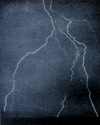 (source)
(source)
|
Alexander George McAdie
(4 Aug 1863 - 1 Nov 1943)
American meteorologist who followed Benjamin Franklin in employing kites in the exploration of high altitude air conditions. He was second director of the Blue Hill Meteorological Observatory.
|
Articles written by Alexander McAdie
published in popular magazines
THE STORAGE BATTERY OF THE AIR
Harpers New Monthly Magazine (Jul 1894)
To ask if we can use lightning, at this the close of the nineteenth century, may seem like a trite question. For do we not all know that the most unique of the many philosophers of the eighteenth century certainly did make use of lightning with more or less success? Aside from the kite experiment, Franklin made other experiments with lightning, some of them looking especially to a practical application of the apparently lawless energy of the heavens. ... more
WHAT IS AN AURORA?
The Century Magazine (Oct 1897)
On the first day of January, 1892, Dr. Brendel and Herr Raschen reached the Alten Fiord, Lapland, to remain several months, studying auroral displays and magnetic disturbances. Brendel succeeded in photographing the aurora, a very difficult thing to do, as all who have attempted it know. The deep reds which are so beautiful to the eye make little impression on the photographer's plates, and the light itself is generally feeble and flickering. Not unaptly have the quivering auroral beams been called “merry dancers.” Even the bright displays are hard to photograph, as we may see from an entry in General Greely's notebook on January 21, 1882. “A most beautiful aurora,” he says, “with intense light, at times sufficiently bright to cast my shadow on the snow. Rice exposed a sensitive plate without effect, but the constantly changing position of the aurora may have been the cause.” ... more
NEEDLESS ALARM DURING THUNDER-STORMS
The Century Magazine (Aug 1899)
The year 1753 is memorable in the history of electrical development. The experiments of the colonial philosopher with lightning had awakened a general enthusiasm in the scientific circles of Europe. In at least three capitals philosophers were pressing hard after Franklin, and great activity was shown, when suddenly there occurred in St. Petersburg a mishap which checked the ardor of all investigators, and exerted an influence which has lasted until to-day. During a thunder-storm, while stooping the better to follow the indications of an electrical “gnomon” (in modern phrase, electrometer), Richman met instant death. ... more
THE THEORY AND PRACTISE OF FROST FIGHTING
The Scientific Monthly (Oct-Dec 1915)
Only in recent years have aerologists given much attention to the slow-moving currents of the lower strata of the atmosphere. These differ greatly from the whirls and cataracts of both low and high levels which we familiarly know as the winds. The upper and larger air streams play a part in the formation of frost, and we do not underestimate their function; but primarily it is a slow surface flow, almost a creeping of the air near the ground, which controls the temperature and is all-important in frost formation. ... more
MUIR OF THE MOUNTAINS
Sierra Club Bulletin (Jan 1916)
A scientific friend recently sent me some measurements of the displacement of earth particles at Ottawa caused by a mountain slide in the Pamir. Seismographs in the Dominion Observatory (and elsewhere) had faithfully recorded the train of earth waves started by the trembling range ten thousand miles away. Moreover it was possible to determine the mass, momentum and energy involved in this fall of a mountain. John Muir would have been interested in these measurements made at a distance, but undoubtedly would have been far more interested in a description of the fall itself, and would have cheerfully started at a moment's notice for Afghanistan or the uttermost part of the earth if assured that another gigantic slide were imminent. Entirely regardless of comfort or personal security he would have watched the mountain fall, exulting in the rare privilege of thus viewing at close range the making and unmaking of the “eternal” hills. We would have had a description, both accurate and eloquent, for he would have written into it not only what the eye beheld, but much that other men must have failed to note, because they failed to feel. His nature was keenly sensitive to the significance of motion in inanimate things. ... more
FRANKLIN'S KITE EXPERIMENT WITH MODERN APPARATUS
Popular Science (Oct 1897)
The recent improvements in kites have suggested perhaps to many the question, “How would Franklin perform his kite experiment to-day?” It may seem a little presumptuous to speak for that unique philosopher, and attempt to outline the modifications he would introduce were he to walk on earth again and fly kites as of yore; for, with the exception of Jefferson, perhaps his was the most far-seeing and ingenious mind of a remarkable age. But the world moves; and in making kites, as well as in devising electrometers and apparatus for measuring the electricity of the air, great advances have been made. Franklin would enjoy repeating his kite experiment to-day, using modern apparatus. ... more
See also:
- 4 Aug - short biography, births, deaths and events on date of McAdie's birth.
- Theory and Practise of Frost Fighting - article by Alexander McAdie from Scientific Monthly (1915)
- Needless Alarm During Thunderstorms - article by Alexander McAdie from Century Magazine (1899).
- The Storage Battery of the Air - article by Alexander McAdie from Harpers New Monthly Magazine (1894).
- What is an Aurora - article by Alexander McAdie from The Century Magazine (1897).
- Muir of the Mountains - Alexander McAdie writing about John Muir in Sierra Club Bulletin (Jan 1916).
- Franklin's Kite Experiment With Modern Apparatus - article by Alexander McAdie from Popular Science (1897).
- Making the Weather, by Alexander G. McAdie. - book suggestion.




